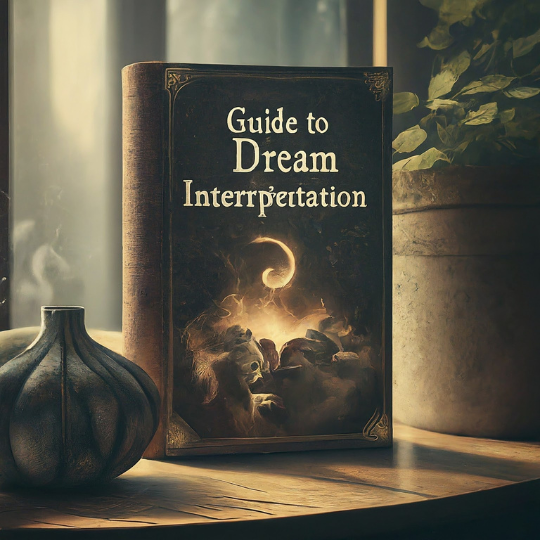Embark on a fascinating journey into the world of dreams with my Look into Dream Interpretation! Unravel the mysteries of your subconscious mind, decode symbols, explore emotions, and discover yourself through the diverse universe of your dreams. Join me in learning one way of understanding what dreams are and why they visit us. Your adventure into self-discovery starts here!
What Are Dreams and Why Do We Have Them?
Dreams are captivating adventures our minds embark on during sleep. They have intrigued humanity for centuries. So let’s jump into the essence of dreams, examine scientific theories on their purpose. And equip you with some tips on unraveling the mysteries of your subconscious mind.
Dreams are the night-time productions of our minds. A kaleidoscope of images, sounds, sensations, and thoughts that unfold during specific stages of sleep. Primarily during the rapid eye movement phase also known as REM sleep. This is when our brains are most active, resembling a wakeful state. On average, a person can experience several dreams each night. Hence the durations can range from a fleeting moment to several minutes. Collectively amounting to approximately two hours of dream-filled slumber. While the exact purpose of dreams remains a puzzle for scientists, several prevalent theories attempt to shed light on their significance. Here is one place that makes for interesting reading if you are looking for specifics: Dream Moods A-Z Dream Dictionary
Theories About Dream Interpretation:
- Dreams as Emotional Architects: According to one theory, dreams serve as emotional architects, helping us process and cope with the myriad emotions encountered in our waking lives. This could manifest as dreams reflecting our emotional states, assisting us in dealing with negative or traumatic experiences. According to the article “What is the functional role of dreaming in emotional processes?“ by Joshua Ekrem Spiritual Counselor. The feelings of anxiety, trauma, stress, or fear during wakefulness might manifest in corresponding dream scenarios, providing a platform for resolution.
- Memory Consolidation and Learning: Another school of thought suggests that dreams play a role in consolidating memories and facilitating learning. Dreams act as a conduit for transferring information from short-term memory to long-term memory, thereby enhancing cognitive abilities. If you’re studying for a test or learning a new skill, your dreams might mirror these experiences, reinforcing what you’ve learned or offering solutions to challenges. See what J. Allan Hobson has to say according to the Oxford Academic.
- Dreams as Creativity Catalysts: A third perspective proposes that dreams are a wellspring of inspiration and innovation, fostering creativity and allowing exploration of various possibilities and scenarios. Engaged in a project or pursuing a goal? Your dreams might be the source of novel ideas and insights, propelling you forward. Read more about what the National Geographic published on this angle!
Practical Tips When Looking into Dream Interpretation:
Now, let’s delve into the practical realm of decoding the cryptic language of the subconscious mind. Dream interpretation is an art, and these are key tools to help you become a master dream decipherer:
- Keep a Dream Journal: Capture the essence of your dreams. For instance; the characters, settings, emotions, and vivid details. This journal becomes your personal roadmap to the dream world.
- Symbol Safari: Dreams often speak in symbols. Unraveling these symbols involves identifying their significance in your personal context.
- Emotions on Center Stage: The emotions experienced during a dream provide vital clues to its meaning. Recall how you felt and consider how these emotions relate to your waking life.
- Pattern Detective: Look for overlapping patterns and connections between your dreams and your current situation, goals, or challenges.
- Contextualize Symbols: While dream dictionaries can provide general meanings for symbols, it’s essential to contextualize them within the framework of your life.
- Explore Your Dream Ecosystem: Your dreams create a rich ecosystem that reflects your inner thoughts, fears, desires, and unresolved issues.
- Seek Professional Guidance if Needed: If certain dreams persistently disturb you or if you find it challenging to interpret recurring themes, seeking the guidance of a professional dream analyst or therapist may be beneficial.
In Conclusion:
In the captivating journey of dream interpretation, always remember: the key to unlocking your dreams’ significance lies in their context, intricately woven into your life’s distinctive narrative. This exploration into the depths of the mind is not just fascinating; armed with knowledge and practical tools, you are now ready to skillfully navigate the dream-infused waters of self-discovery.
Approach dream interpretation with a blend of curiosity, introspection, and a touch of reverence for the mysteries your subconscious mind unveils. Embrace the diversity of your dreams, recognizing each as a unique key unlocking different facets of your psyche.
So, as you lay your head on the pillow tonight, may your dreams be gateways to profound self-discovery and personal growth. Here’s to happy dreaming! May the secrets of your subconscious mind weave a tapestry of insights and revelations, unveiling a world of wonders. Sleep well, and dream on!
P.S.
Furthermore, don’t toss and turn any longer, if you’re yearning for a peaceful night’s sleep and the bonus of shedding those extra pounds! Sail over to Sleep and Slim: Biohacked Results and unlock the secrets to your best sleep yet. Sweet dreams and a healthier you await – embark on this transformative journey now!



